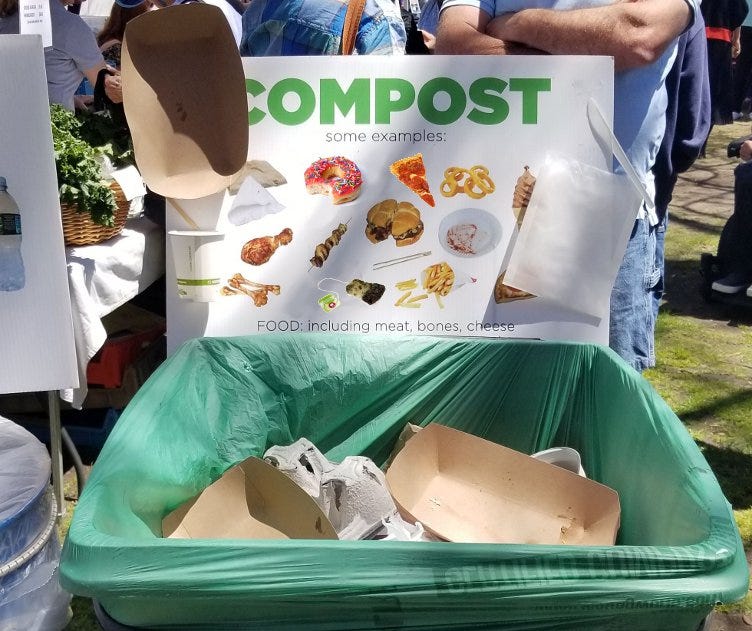How Covid-19 has screwed up composting, in 5 examples
Issue 171: Food waste is up; composting is down. Seems like we're going in the wrong direction.

Hello! Welcome to Nosh Box, a lunchtime-ish food newsletter that’s increasingly relying on the “ish” of “lunchtime-ish.”
Read yesterday’s dispatch: King Arthur Flour's baking hotline is here for your sourdough starter and your quarantine loneliness
As I’ve mentioned here previously, a significant food system concern of mine — especially during Covid-19, but in general as well — is food waste. During the pandemic, waste of all types is increasing. Residential waste is up 30%, according to collection company Republic Services. Meanwhile, the pandemic has also kneecapped initiatives to collect food scraps, mandate composting, and fund waste reduction.
At The Counter, Jodi Helmer lays out five ways the pandemic has impacted local composting and waste reduction efforts around the country.
Delays in legislative initiatives: In Maryland, for example, two mandatory composting/recycling bills aimed at food waste reduction were introduced in the state legislature in January — but legislators cut their session short in March, stalling the bills.
Curbside pick-up programs are placed on hold: In New York City, the budget for the compost pick-up program (which collected 50k tons of waste last year!) has been diverted toward Covid-19 health and safety, and the Dep’t of Sanitation says pick-up won’t pick back up again till June 2021.
Drop-off facilities are closed or underutilized: In Madison, Wisconsin, a curbside compost pick-up pilot was successful but deemed too expensive to scale, so the city opened new drop-off facilities. Due to the stay-at-home order, they were closed till May 4, and even now, utilization is low; leaving the house feels risky so folks are just throwing away their scraps.
Staffing shortages: In Vermont, a 2012 law required residents to separate their compost for curbside pickup starting July 1, 2020, but trash haulers are concerned they won’t have the staffing capacity amid the pandemic to handle it. And in Chittenden County, surrounding Burlington, nearly all drop-off centers were closed in March after staff were exposed to someone with Covid-19-like symptoms.
Food rescue/donation efforts are improving: Some good-ish news! The pandemic, while increasing the levels of food waste, has also shined a light on it. The USDA granted $19 billion for fresh food boxes, the questionable rollout of which I’ve written about before; industry groups, supermarkets, and nonprofits are also donating food.

(photo courtesy Black Earth Compost, which does curbside pickup across New England)
I think awareness of food waste has increased somewhat during the pandemic, primarily because splashy photos of dumped milk and potatoes have been on the covers of major newspapers and websites. (A concern I have with this, though, is that if these photos aren’t properly contextualized, the visual could lay the blame for food waste at the feet of farmers, when clearly responsibility lies within a much more complex web of stakeholders.)
Awareness is an important first step, of course, but behavior change takes much more than just generating knowledge that food waste exists. Orgs like NRDC, ReFED, Food Recovery Network, and more have been working for years to translate that awareness into action, and I’m worried now that the pandemic is interrupting people’s newly formed habits at a pretty vulnerable time.
We might have to start all over again convincing people to separate out compost, to drive to the drop-off facility, to direct municipal funding toward waste reduction. Food waste is crawling onto the priority list — for both consumers and local governments! — but it’s still low enough that, unfortunately, it’s proving easy to knock off when times get tough. But my hope is that, this time around, greater public awareness would make it easier to get people on board with reducing food waste. And now that we’re seeing where the weakest spots are in our current system, the road ahead is a little more clear.
Here’s the full article from The Counter.

And before we go, I think this person has hacked cooking:

(h/t Ty. Hey, if you have articles/tweets/jokes/ideas/foundational theoretical underpinnings you want to see in this newsletter, shoot me an email at jaredhkaufman@gmail.com (or hit reply) or hop in the comments section below!)

